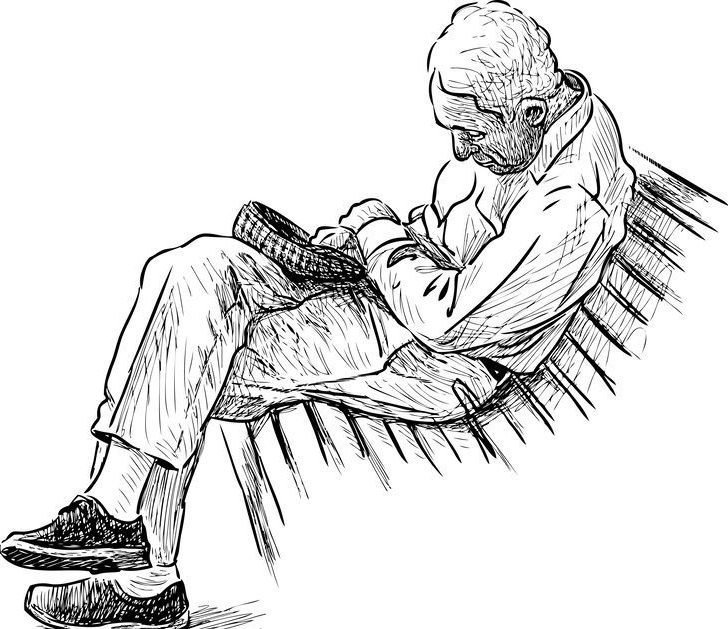The welfare investigator was my type alright. Dark chocolate skin. Curvy like a Coke bottle. Big, almond-shaped eyes. Long, false eyelashes, glued on rather badly like she was late for work when she put them on. Springy twisted strands of kinky hair pulled out and upsetting the laws of gravity, jumping every which way.
“My name is Julia Barnes,” she said. “Did you bring a picture ID with you, Mr. Rich?”
I pulled my drivers license my wallet, threw my worn wool overcoat loosely over the back of the wooden and sat.
“Forgive me for sounding forward,” I said. “But I’ve always admired black women who keep their hair natural,” I said.

We were at the far end of a narrow row of small cubicles, all stripped naked but for a desk and two chairs across from each other. On her side was desk was a computer, a landline telephone, my file and a cellphone.
“It’s a wig,” she said.
“Really? Do you always wear this kind of get-up for work?”
“Sometimes,” she replied, smiling. Her teeth were straight and white like one of those cosmetic dentist advertisements you see on the subway train.
She checked my photo ID against her computer screen, and handed it back to me. “Did you bring your birth certificate and social security card, Mr. Rich?”
“Please, call me Art.”
“It’s against regulations to call clients by their first name.”
“Then may I call you, Julia?”
“As you wish, Mr. Rich.”
“Thank you, Julia.”
“So did you bring your birth certificate and social security card with you today, Mr. Rich?”
I spilled the contents of the large, wrinkled manila envelope I brought with me on my side of the desk and fished through the papers, finding my folded birth certificate and tattered social security card.
“Did you fill out the form the receptionist gave you in front?”
I drew a blank. “What form?”
“When you came in today, the receptionist gives everybody a form to fill out.”
“Damn. I totally forgot,” I said, starting to turn out my pockets like a mugger, starting with my pans and moving on to my winter coat, making sure to reach down through the hole in the pockets where scraps of paper, receipts and napkins fell through to the bottom lining.
“I’m usually quick to fill out these types of forms, but I hardly recall getting it. I suppose I was a little depressed having to apply for public assistance.”
“Don’t feel depressed, Mr. Rich. We’re here to help,” said Julia, empathetically.
After checking my pants, shirt and coat pockets twice, I found the forms folded in half amongst the pile of papers on my side of the desk. I must have inadvertently stuffed them in the manila envelope when the receptionist gave them to me. Julia handed me a pen and I began filling it out. Questions were all geared to find any source of income or savings or even cash in my pocket that I had. Mugged again. As I checked off answers, Julia’s cell phone buzzed like a bee and knocked against her desk until she answered. .
“…I told you my daughter’s away this weekend,” I overheard her say. “… I’m not telling you what to do. You make the decision. You’re a man… If you feel that’s more important than spending time with me then do what you have to do. No more excuses. Either you’re coming over or you’re not… Then fine, do what you have to do. I’m with a client now.”
“Boyfriend problems,” I said, after she hung up.
“He’s not my boyfriend,” she replied, somewhat defensively.
“You’re Jamaican.”
“How’d you know?”
“I detected a slight accent when you spoke with your man.”
“I told you he’s not my man.”
“It’s more than your accent though. It was that Jamaican feistiness when you spoke with him.”
“What do you know about Jamaican feistiness?”
“My ex-wife is Jamaican.”
“So you like Jamaican women?”
“ You know the old saying, ‘Once you go Jamaican every other woman is just fake’n.’”
Julia laughed. “Do you have a letter from your landlord?
I fished through my documents, landing my landlord’s letter.
“You only pay $475 per month?” she asked, reading it.
“My landlord’s a good man. Then again, I live in a basement wrap-around-boiler room apartment, pay rent in cash and seldom bother him about repairs.”
“Some landlords are angels,” Julia replied. “Mine is the same way.”
“You live in Brooklyn?” I asked.
“Canarsie.”
“I know Canarsie very well. I’m a journalist by trade and it used to be part of my beat.”
“Did you bring a utility bill addressed to you?” she replied, unimpressed.
I dumpster dived through my pile of documents before coming up with my cell phone bill. Julia excused herself to make copies of everything I handed her.
After she disappeared, I cursed myself for telling her I was a journalist. It’s information I often divulge to strangers in casual conversation because it makes me feel more important. LIke I’m somebody. But now it had the opposite effect. Instead of reinvention, it was recycling. The stark reality was my importance mattered as much as all the other people who sat with me in the waiting area to see welfare investigators. We all sat and waited. Young mothers trying to quiet pre-school aged children, all high on sugar from fast food and candy. Some scrolled through phones. Others ate food out of styrofoam containers purchased outside at Chinese restaurants or Muslim food stands. Mainly black or Hispanic, but we were also Hassidic Jews, Muslim women in burkas, Chinese and middle-aged white men like me. We sat sturdy metal frame chairs beneath humming florescent lights, as the TV mounted high on the drab thickly-painted yellow cinder block walls was turned to the local news channel. America’s great melting pot boiled into a stew of poverty.
 I sat playing in my head for the umpteenth time my stupidity for jumping at the buyout offer from my last staff reporter job. At the time, I considered myself a maverick. Refused to ever hold a job for more than the biblical seven years. My collegaues at the time saw it differently. A media whale swallowed the large chain of weeklies where we worked and they saw it as a ticket to the big time. And some were right. Since my buyout, they had skillfully scaled the media tower and were now editors and top reporters at major news outlets in New York City.
I sat playing in my head for the umpteenth time my stupidity for jumping at the buyout offer from my last staff reporter job. At the time, I considered myself a maverick. Refused to ever hold a job for more than the biblical seven years. My collegaues at the time saw it differently. A media whale swallowed the large chain of weeklies where we worked and they saw it as a ticket to the big time. And some were right. Since my buyout, they had skillfully scaled the media tower and were now editors and top reporters at major news outlets in New York City.
But not me. The buyout included a decent severance and then unemployment. I could use the time to write a second novel, I thought. Better to march to your own beat than to “Stay calm and carry on,” which were the words some of my colleagues taped to the side of their computer.
But the years tumbled together and rolled down a cliff. The novel was written, but unsold. Sure I had a few seventy-five or hundred-dollar writing assignments now and again, but it wasn’t enough to cover my rent and now I was at risk of being thrown out into the street. I was now in my fifties, and the hand-ups were few and far between. So I applied for public assistance. It is only temporary, I told myself. Something will materialize. Another staff reporter job, or perhaps getting a golden parachute communications gig with an elected official. But my gut growled differently. It was the scrap pile for me.
Julia came back, and skimmed the form, I had now completed.
I see you have a bank account,” she said.
Yes, but if you noticed, it only has four hundred and change in it. And I’m about to close it because the balance isn’t big enough to keep the bank from taking $20 dollars a month as a fee.”
“You shouldn’t close it because then social services will think you’re hiding something,” said Julia.
“But if I keep it open the bank will continue to take the charges until there’s nothing left.”
“I don’t know what else I can tell you.”
Julia’s suggestion gave me the confidence to risk asking her the one question on the form that had me in a quandary. “I see this form asks me about my 401k,” I said. “Will social services force me to go into mine? It’s all the money I have in the world after more than thirty years of working. And it really isn’t much, but it’s all I have.”
Julia looked up at the chipped paint ceiling and batted her badly glued eyelashes. “Forgive me Lord,” she whispered as if God dwelled between the building’s floors.. “But I did not hear this man tell me about a 401k. I never heard him mention it and I know nothing about it.”
I took the form back and checked off that I had no 401k. “I don’t like to sound like a sad sack, Julia, but it’s been very hard for me to come here and apply for assistance. I spend more time than I care to say going over all the mistakes I’ve made in my life.”
“Count your blessings, not your mistakes, Mr. Rich. You said you enjoyed the Jamaican culture. You know what our secret is? It’s faith. With it anything in the world can be achieved.”
“That’s something my ex-wife used to tell me all the time. That faith has wings,” I said, suddenly missing her very much.
“Your ex-wife knew of what she was saying, Mr. Rich.”
“Tell me, Julia, have you ever dated a Jewish man?” I asked.
“No.”
“You should try it. Once you go Jew nothing else will do.”
Julia stifled a quiet laugh as if we were kids in a library and the librarian was watching.
“And a Jewish man can always make you laugh,” I whispered.
“Jamaicans love to laugh,” she said.
“So what do you say? Maybe we can meet outside this office sometime. Grab a coffee or something?
Julia smiled politely. “You’re paperwork is complete, Mr. Rich.”
“So what do you say? Why don’t you give me your phone number?”
“I don’t give out my phone number to clients.”
“Yes, of course,” I replied. “That is the prudent thing.”
“Do you have any more questions about this interview, Mr. Rich?”
“Will I be approved for cash assistance and food stamp benefits until I get on my feet?”
“You will begin getting them on the 15th of the month.”
“Then thank you for everything, Ms. Burns,” I said, getting up and putting on my worn coat. “But if you ever change your mind about going out, feel free to give me a call. My contact information, as you know, is in the file.”
Ms. Burns closed the file.
“Have a good day, Mr. Rich, and the best of luck to you.”






